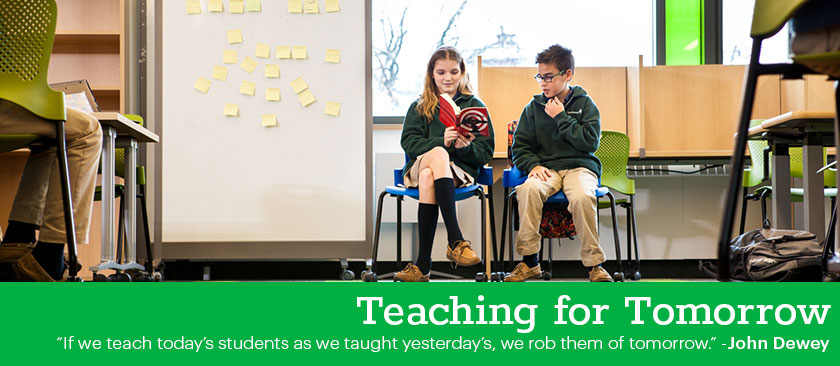A
transformative year in Greenwood’s history is coming to a close. In his last
blog address of the school year, Allan Hardy evaluates the results from two
student surveys, and reflects on how our evolved facilities have impacted the
Greenwood community.
It’s hard to believe we have almost
completed our first year in our new space. While our community began the year
with great excitement, there were also real questions about how our new
building would alter the school and the quality of the student experience.
Would our larger physical space detract from Greenwood’s strong sense of
community? Would new different classroom structures hamper personalized
learning, or enable it?
Over the past several weeks we have
conducted two separate student surveys that shed positive light on questions
like these. When asked on the student engagement survey,
conducted by researchers at the University of New Brunswick, to list some of
the things they liked about Greenwood, students overwhelmingly cited their teachers
and our school’s strong sense of community. This result was echoed in another
student survey, conducted by Panorama Education which focused on
students’ perception of their teachers and classes. Student relationship with
teachers, which looks at how well they think their teachers know them, ranked
in the 90th percentile.

On the student engagement survey, we posted
modest gains from last year in our students’ sense of belonging and their
development of positive friendships. Both scores also exceeded Canadian school
norms, as did student involvement in athletics and clubs. Gains were also noted
in interest and motivation, as well as being challenged at the appropriate
level. This latter result was close to 30% higher than the Canadian norm. Our
biggest gains over the December Panorama survey were in students being able to
explain their thinking and trying different strategies when they get stuck.
Both gains, as well as the strong result in being appropriately challenged,
speak to a growing ability to self-direct one’s learning, which is a key
outcome of personalized learning.
We also took a close look at the results
from students who were in co-taught classes, as there have been many questions
about this approach throughout this year. Survey results in co-taught classes
showed improvement in learning how to direct your learning and understanding
content. These improved results were equal to those of a traditional classroom.
Survey results also indicted that engaging all students consistently and
managing the learning environment effectively are two areas to continue to work
on next year with the co-teaching model.
These surveys, as well as other feedback
gained throughout this year, will inform our planning for next year. We are
going to be more intentional about how we schedule co-taught classes. Many of
the teachers participating in our Summer Teacher Institute will focus on
further developing our use of co-teaching. Students also indicated they would
like greater access to the gym, the fitness centre and the theatre, so we are
going to see what can be done to accommodate this need.
I am really pleased with these results and
by how hard our teachers and staff have worked to achieve them. Though there is
still plenty to work on next year, these results emphasize that the changes we
have made are meeting the needs of our students.







